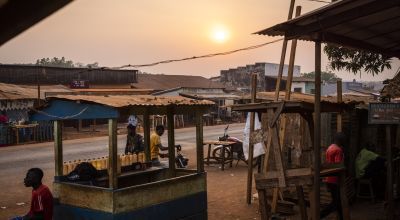
Read our 2023 annual report

Knowledge Hub
Any would-be gardener is familiar with the stages and stresses that come with trying to grow food. The planting, the weeding, the watering, the hoping for a successful harvest and then - finally – getting to see the fruits of your labour, green fingers that sprout a rainbow of accomplishment.
But what if the harvest meant your children would have food to eat, the chance to go to school and a home to call your own?
For a group in the Central African Republic (CAR), the food they have grown represents a lifeline to a brighter future, a better life for themselves and their families.
'Alarming' hunger levels
Life in CAR is difficult - conflict has been ongoing since 2013 and has displaced almost a quarter of the population.
CAR was classified as experiencing “alarming” levels of hunger as it ranked the highest of any country in last year’s Global Hunger Index (GHI) report.
A staggering one in 10 children in CAR do not live to see their fifth birthday and nearly 75% of the population lives below the international poverty line.
Against this difficult background, incredible communities are working together to fight hunger and beat the odds.
Concern, with funding from the European Union, is working with these communities in the Mobaye and Zangba regions, supporting them to meet their basic needs as they lift themselves out of poverty.
This multi-sectoral project addresses some of the urgent needs of vulnerable people in the host and displaced communities in the area, including improving food security, shelter, and access to water, hygiene and sanitation services.
It aims to reach 8,000 people with food assistance during the lean season and they are supported to grow vegetables. More than 600 people who have been displaced built their own shelters, including toilets, using local building materials and cash support. More than 6,000 people have also benefitted from water points being built or rehabilitated.
Diversifying diets

Awaou Djibirilla’s world was turned upside down when she was widowed with six children to care for. She started braiding hair to earn money but struggled to make ends meet.
She met Concern last year and has received food, cash, and seeds. She has been able to grow a carrot and tomato garden, which has helped her to diversify her family’s diets. Djibirilla works alongside other women in the village she is from - in Zangba - on a large common plot of land.
She said: "What I like most is that there are no problems among us with sharing, because each of us can drop by the garden at any time and collect what she wants during the harvest.”
As her crops flourish, so do her hopes for the future. “As a widow, I cannot provide for my children on my own. The project has had an impact on me and my children. I've learnt to work in the fields. I've also received cash, which has helped me to provide for my children.”
Supporting education

Jean Pierre Kpoto is also enjoying the rewards of his hard work. He works as a farmer and fisherman and through the programme has completed training in techniques such as planting and maintaining crops, harvesting, drying techniques and storage.
Jean Pierre and his wife are already looking to the future and say that their harvest will help them to secure a brighter future for themselves and their two children.
“We will automatically plant these seeds this week. For my part, my wife and I have already planned that at harvest time, we will sell part of the harvest to pay for our first daughter's schooling, eat some of the food and then keep the rest to replant the following year," he said.
Fighting for a better life

People with physical disabilities face additional challenges in CAR, including increased risk of violence and attacks and barriers to accessing basic services, according to the UN Security Council.
Lewis Mudge, Africa researcher at Human Rights Watch, has warned: “People with disabilities are suffering disproportionately in the Central African Republic and then falling through the cracks.”
Tiyassi Joanette understands these challenges all too well - she was born with a physical disability and had to rely on her mother financially as she was unable to find work in a traditionally agricultural region.
Tiyassi met Concern last year and has received food items and seeds, and she has now set up a small food business with the support of her sisters in Mobaye. Under the programme a shelter was also built for Tiyassi and her four children, and they received some non-food items, allowing them to move out of her mother’s home.
Tiyassi says that her disability has caused barriers in her life and her family has struggled to get by, but being part of this programme has led to new opportunities.
"The shelter that Concern has built for me has enabled me to get out of my mother's house with my children. I feel more independent, because at my age, living with my parents is not easy. And I will continue to fight for a better way of life," she said.
In Partnership With

Our impact in 2023
people reached through our emergency response
people reached through our health interventions
people reached through our livelihoods programmes



